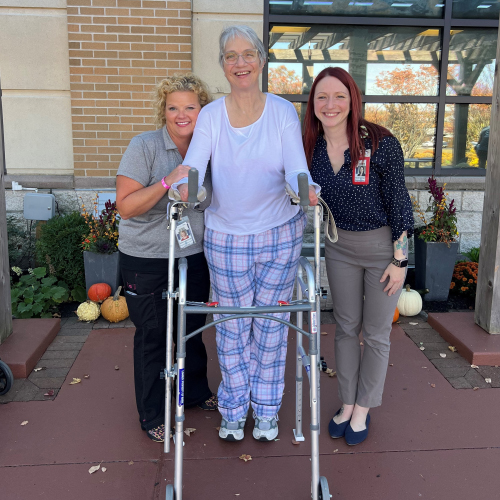
Elizabeth Kase had never been to a support group until she was an inpatient at Reading Hospital Rehabilitation at Wyomissing as an amputee.
“I didn’t know what to expect or what it was going to be,” Kase said. “It turned out to be a group of people at different stages of rehabilitation sharing every emotion under the sun together, listening to one another and giving and receiving compassion and empathy.”
Support groups offer encouragement and advice, as well as practical tips for dealing with illness, recovery, and the challenges of everyday life – all things Kase experienced at the Amputee Support Group, one of the support groups offered at the facility.
Reading Hospital Rehabilitation at Wyomissing offers seven different support groups for numerous diagnoses and life-altering situations, including aphasia, stroke, brain injury, amputees, spinal cord injury, Parkinson’s Disease, and a Caregiver Support Group, which are all overseen by Nicole Hartman, MSN, RN, MRMC, and Rebecca Orischak, OTR/L.
“Members of the group taught me so much,” Kase shared. “I learned strategies for taking care of things in the summertime, how to wash my liners and so many other things I needed as a new amputee. These groups can help you take additional steps you may not have thought of and really show you that you’re not alone.”
While each support group is a little different, every session is driven by the attendees and offers a hearty mix of presentations, check-ins, collaboration, and conversation in a judgment-free environment. All sessions are completely free of charge and don’t require any form of pre-registration.
Clinicians at the facility acknowledge how crucial these spaces are to the rehabilitation process and understand the value of the lived experience. In a previous Amputee Support Group session, attendees engaged in an emotional healing presentation with a fellow amputee. Hartman, program director of acute rehabilitation, shared that the facility sees patients from many different types of backgrounds and experiences, so it’s important to provide safe spaces for a variety of diagnoses.
“People in our community are going through so many different things,” Hartman said. “These support groups really help us to carry over the education we provide to our patients in a way that is almost impossible to replicate. There is great value in providing spaces for people to collaborate, share advice, and listen to those who have also had similar experiences.”
“Our staff’s involvement is invaluable,” said Orischak, coordinator of professional development and education for the therapy continuum. “Oftentimes, patients are not at a point in their recovery where they can process all the education they receive during inpatient, and our staff members really help to continue that education through our support groups.”
Kase said she is deeply grateful for the care she received at Reading Hospital Rehabilitation at Wyomissing, but especially so for the Amputee Support Group. As a way to pay it forward, she currently volunteers her time at the Amputee Support Group and offers to go with new attendees to help alleviate those barriers of anxiety or fear.
“There is always fear surrounding something new or different, and that first step is always the hardest,” Kase said. “I took the leap and knew that I was in the right place. You’re always among your friends here.”
Support Groups
For more information about Reading Hospital Rehabilitation at Wyomissing (RHRW) and the support groups offered at the facility, please visit:
